PLEASE NOTE:
While the following article relates to your Google search, the services and methods at Goodwin Hypnosis may differ from those mentioned below. Since 2007, we have helped thousands of clients to overcome emotional and behavioral challenges when all else had failed. According to many of them (and their referring healthcare providers), our methods are faster than talk therapy, easier than willpower, and safer than medication. If you’re ready to resolve your issues, skip the article and visit the rest of our website, where you can learn about our unique approach, watch client testimonial videos, and discover how working with us one-on-one could be the solution you’ve been searching for.
We can help you with a variety of issues relating to emotional trauma. While we don't diagnose disorders like PTSD, we have helped hundreds of clients to overcome a wide range of traumatic experiences and their negative effects with methods that are more efficient and comfortable than CBT or EMDR. If you would like to learn more about working with us one-on-one to clear your trauma, click here.
Introduction
In a world where emotional scars often go unnoticed, the concept of Little t trauma emerges as a crucial yet subtle force shaping individuals' lives. Unlike the more recognized Big T trauma, which involves catastrophic events, Little t trauma encompasses the cumulative effects of seemingly minor experiences—chronic criticism, emotional neglect, and social exclusion—that can quietly erode self-esteem and well-being over time. Understanding these hidden wounds is essential for fostering emotional healing and resilience.
By exploring the profound impact of Little t trauma and the pathways to recovery, including innovative therapies like hypnotherapy, individuals can begin to reclaim their self-worth and transform their emotional landscape. This article delves into the significance of acknowledging these experiences and the strategies available to facilitate healing, ultimately illuminating a path toward a more empowered and fulfilling life.
Defining Little t Trauma: A Subtle Yet Significant Impact
Minor t experiences signify the cumulative effect of seemingly insignificant events that can greatly influence a person's psychological health. Unlike Big T events, which involve significant life-threatening situations, Little t encompasses occurrences such as:
- Chronic criticism
- Neglect
- Ongoing feelings of inadequacy
Although these experiences may not seem significant on their own, they can result in long-lasting psychological scars that diminish self-confidence, self-esteem, and self-worth. Comprehending Little t stress is vital as it emphasizes the significance of addressing all types of distress, regardless of perceived severity, to promote psychological healing and resilience.
Through the transformative power of hypnosis at Goodwin Hypnosis, individuals can unlearn these limiting beliefs rooted in both Big T and Little t experiences, paving the way for personal growth and improved mental well-being. By addressing specific challenges such as:
- Anxiety
- Compulsive habits
- Unresolved trauma
Hypnosis can play a vital role in enhancing self-confidence and self-worth, ultimately leading to a healthier psychological state.
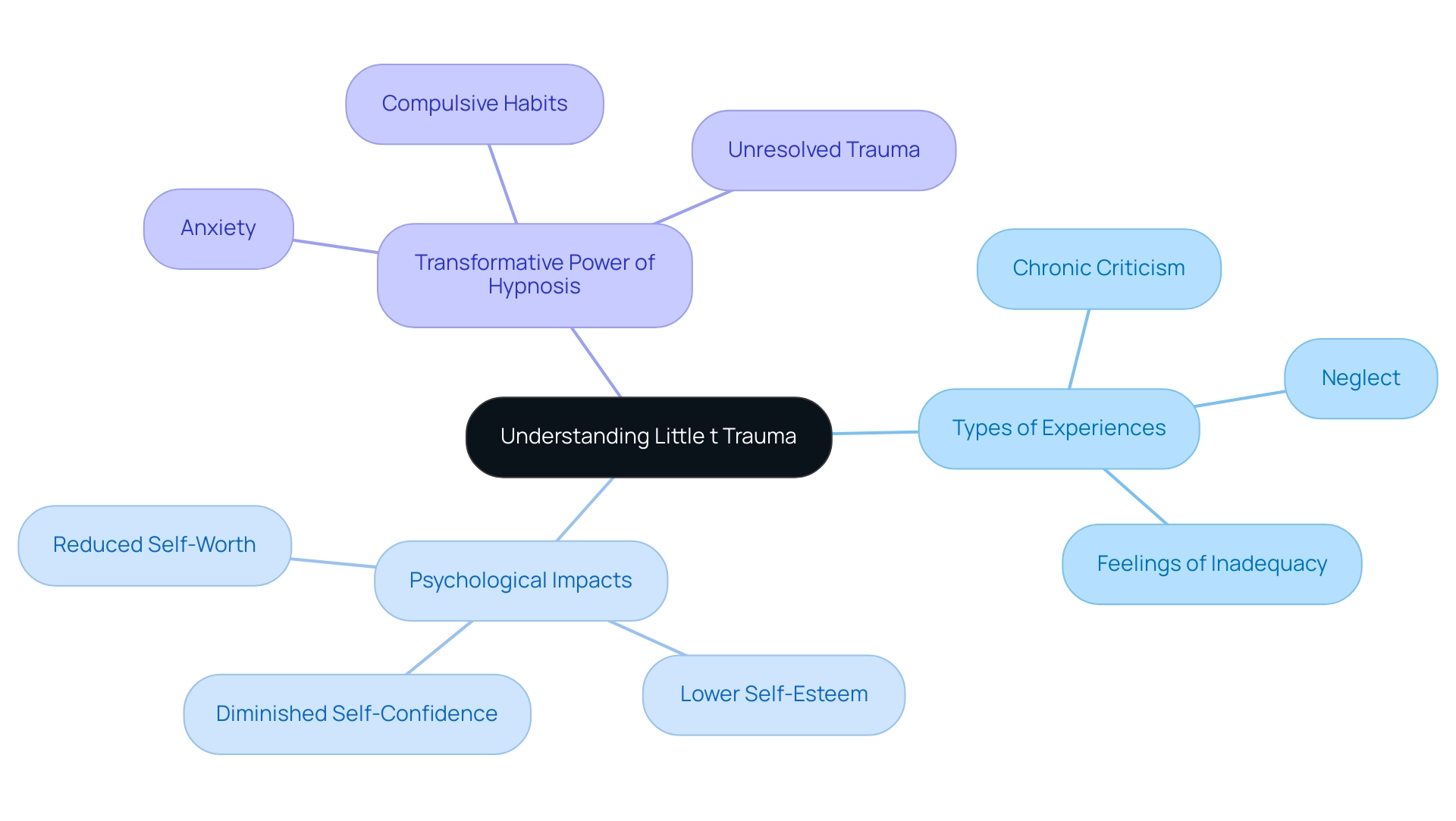
Recognizing the Hidden Examples of Little t Trauma
- Chronic Criticism: Constant negative feedback from parents, teachers, or peers can lead to feelings of inadequacy and self-doubt, impacting self-esteem over time. For instance, Jane, a 60-year-old woman, faced obesity connected to her psychological struggles rooted in childhood experiences. Through hypnosis, especially methods such as NLP (neuro-linguistic programming) and memory reconsolidation, she reframed her memories of feeling unloved, which eased her eating habits.
Neglect: Growing up in an environment where personal needs are consistently overlooked can result in difficulties forming healthy relationships later in life. Jane’s experience exemplifies this, as her feelings of neglect contributed to her weight issues.
-
Social Exclusion: Experiences of being left out or bullied, even if they seem minor, can contribute to feelings of isolation and anxiety, as seen in various testimonials from clients who have successfully addressed their psychological distress through hypnotherapy.
-
Parental Overprotection: While often well-intentioned, excessive protection can stifle independence and lead to anxiety about facing the world. Clients report that through hypnotherapy, they have learned to confront and reframe these protective behaviors, fostering a sense of empowerment.
-
Unmet Expectations: Regularly feeling pressure to meet unrealistic expectations can create a sense of failure and chronic stress. This was a common thread in testimonials, where people shared how hypnosis helped them release these burdens.
Minor Medical Procedures: Experiences like frequent visits to the dentist or minor surgeries can cause anxiety and fear that linger long after the events. Hypnosis has been effective in helping clients process these fears, allowing them to move forward.
- Constant Comparisons: Being frequently compared to siblings or peers can instill a sense of inadequacy and lead to lifelong self-esteem issues. Acknowledging these types of Little t distress is crucial for individuals to comprehend their reactions and pursue recovery. As emphasized in the case studies, many have discovered significant healing through hypnosis, which enables the reframing of previous events and the release of mental burdens.
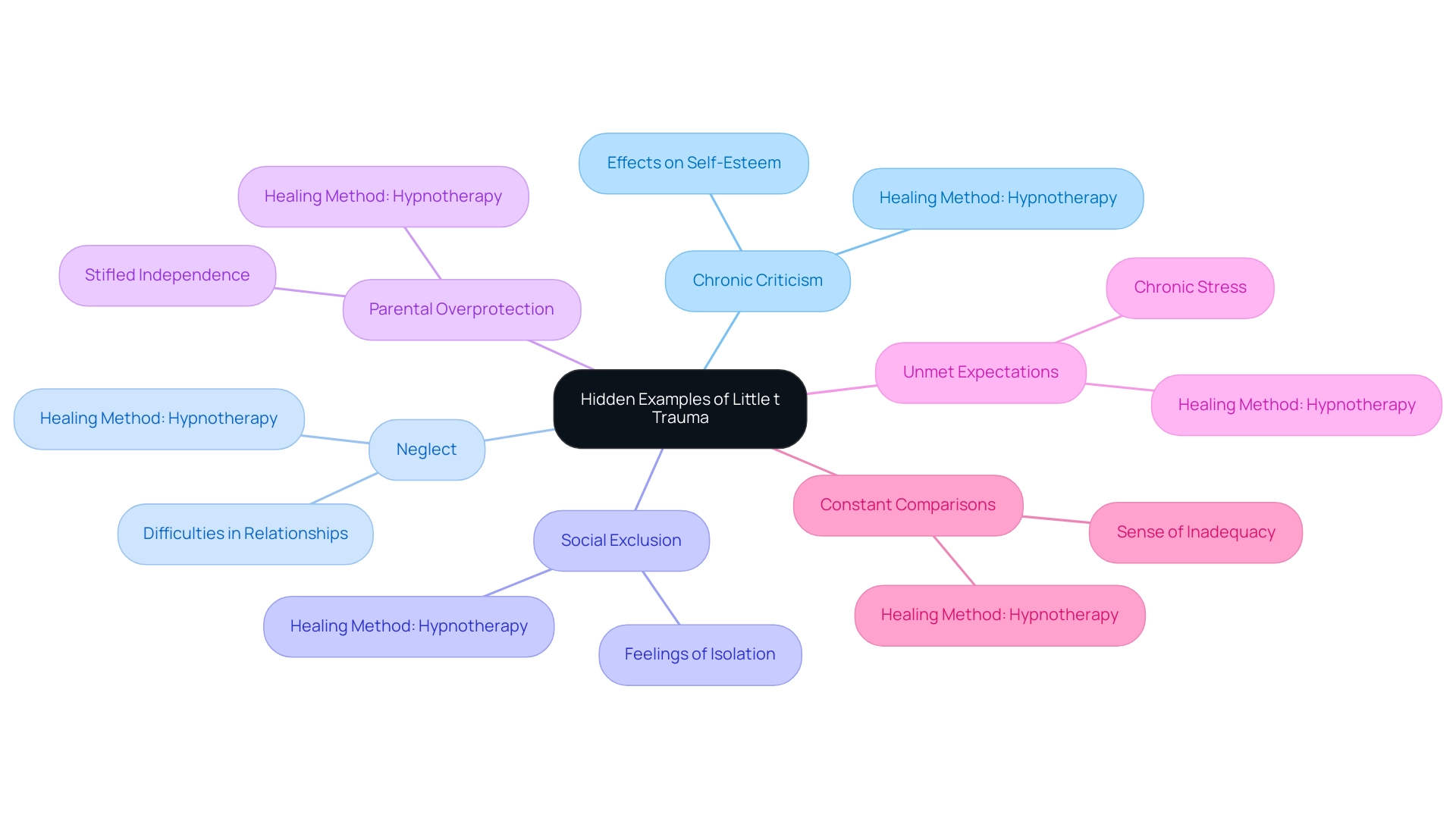
The Long-Term Effects of Little t Trauma
The effects of Little t stress can be subtle yet pervasive. Individuals may experience:
-
Anxiety and Depression: Persistent feelings of inadequacy can lead to anxiety disorders or depression, as individuals struggle with self-worth and affect regulation. Many clients have found that addressing these feelings through hypnosis and NLP techniques, such as guided imagery and reframing, has led to significant improvements in their mental health, with testimonials highlighting rapid progress and relief.
-
Difficulty in Relationships: Unaddressed trauma can create barriers to forming healthy connections, leading to patterns of avoidance or dependency. Clients report that overcoming their baggage has transformed their relationships, fostering deeper connections and improved communication.
-
Coping Mechanisms: Individuals may resort to unhealthy coping mechanisms, such as substance abuse or avoidance behaviors, to manage their distress. However, through guided sessions that concentrate on the root causes of their challenges, many have discovered healthier coping strategies, resulting in lasting change.
Understanding these potential outcomes emphasizes the necessity of recognizing and addressing Little t stress in order to promote healing and emotional well-being. Furthermore, the prevalence of anxiety disorders, frequently arising from such experiences, highlights the importance of effective treatment options. The impact of hypnosis and NLP at Goodwin Hypnosis, provided through convenient Zoom-based online sessions, offers a path to recovery that many have found to be not only effective but also life-changing.
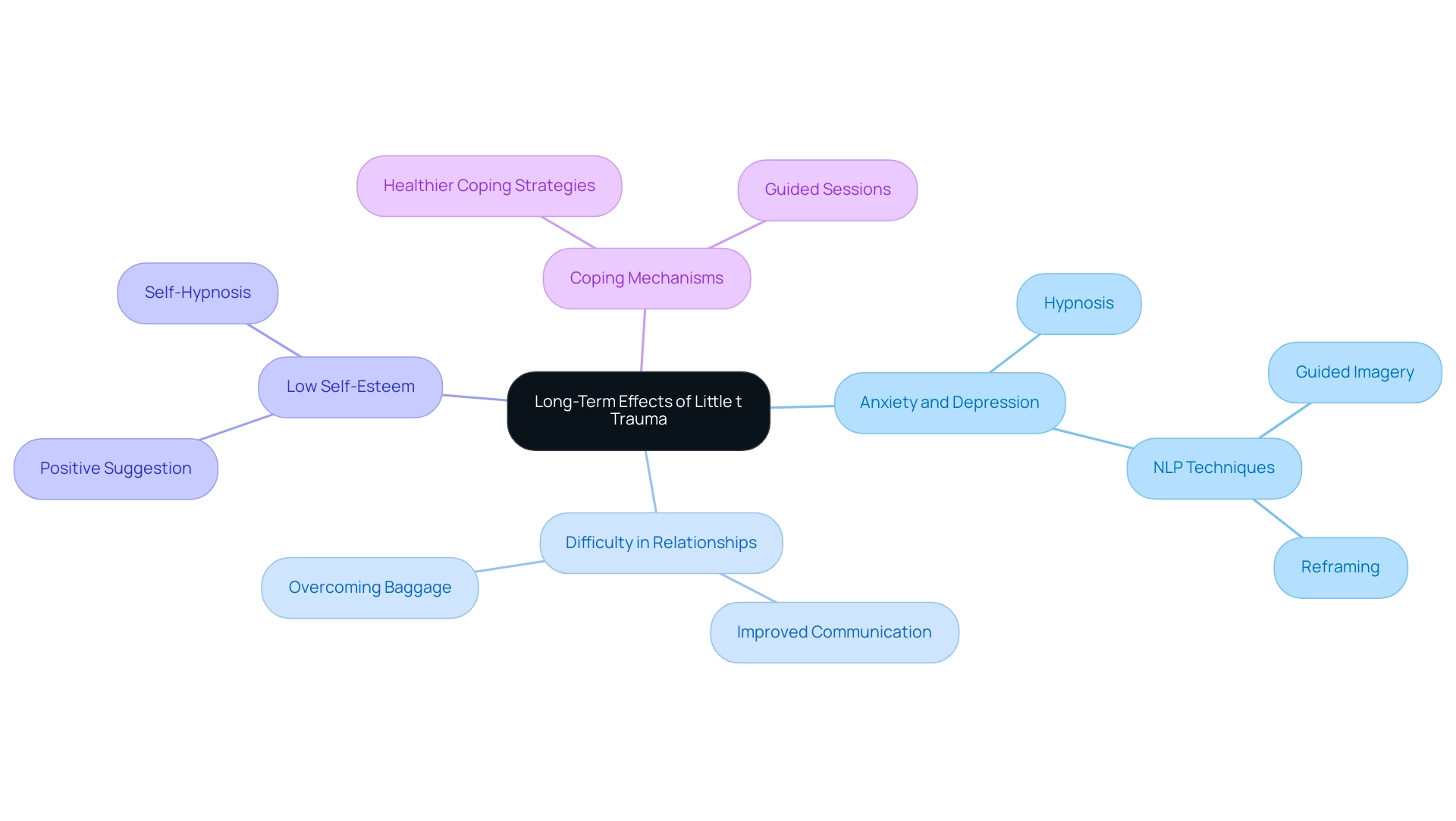
Strategies for Healing from Little t Trauma
Recovering from Little t distress involves a multifaceted approach that can significantly benefit from our personalized sessions. Here are some effective strategies:
- Journaling: Writing about your experiences can help process emotions and identify patterns related to Little t trauma.
- Mindfulness and Meditation: Practicing mindfulness can promote self-awareness and help manage anxiety related to past experiences.
- Therapy: Working with a licensed therapist can offer assistance and direction in managing the psychological terrain of distress.
- Hypnotherapy: Utilizing hypnotherapy can facilitate deep psychological healing by addressing subconscious beliefs formed from Little t trauma, offering transformative potential for recovery.
- Support Groups: Connecting with others who share similar experiences can foster a sense of community and understanding, which is invaluable in the healing process.
- Self-Compassion Practices: Learning to treat oneself with kindness and understanding can counteract the negative self-talk often associated with Little t trauma.
By implementing these strategies, people can begin to reclaim their mental well-being and work towards a more balanced and fulfilling life, paving the way for empowerment and personal transformation. If you think that psychological distress is the reason for your stress, take the first step toward recovery by reaching out to us for a private initial consultation.
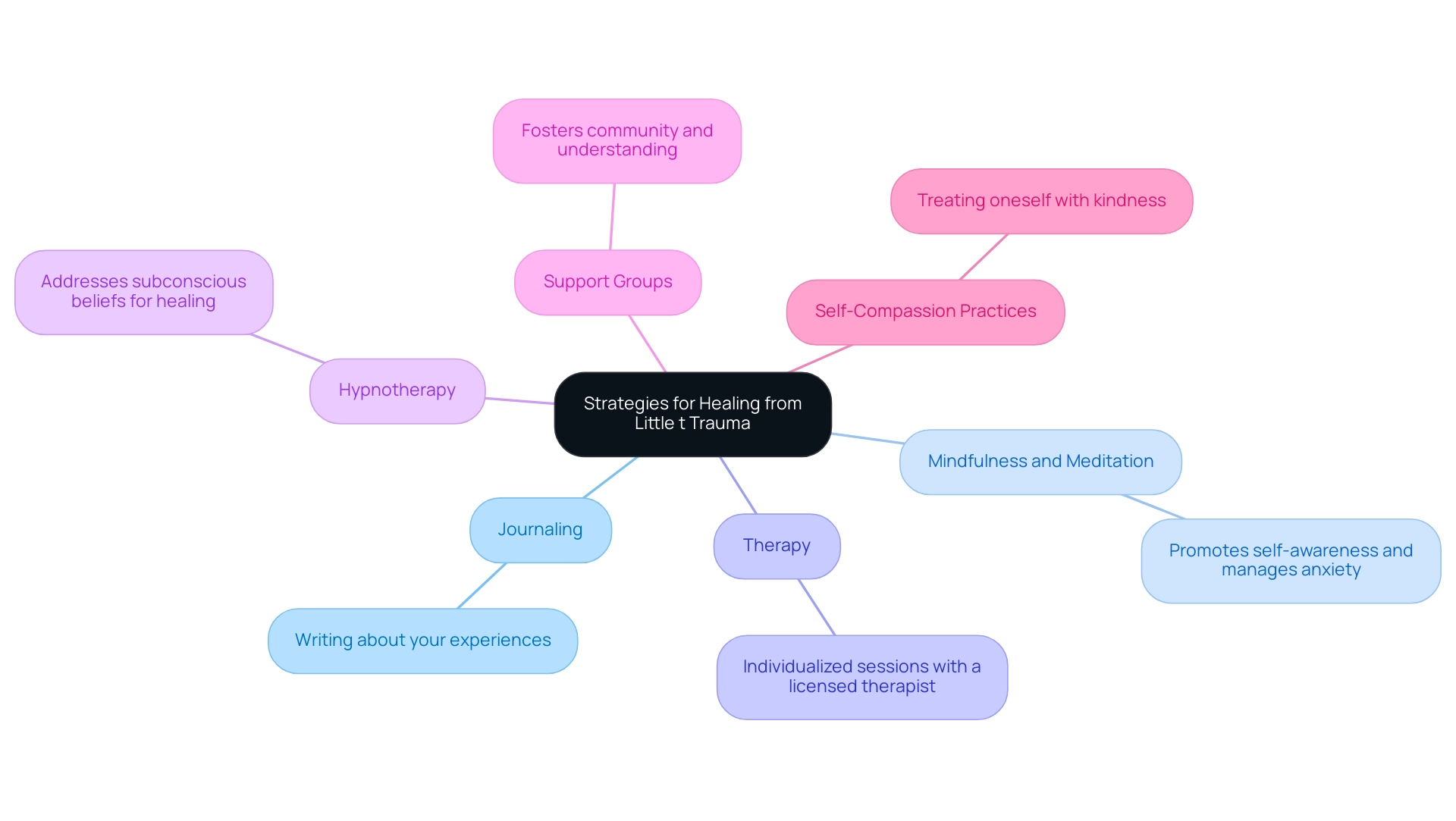
The Importance of Acknowledgment in Healing
Acknowledgment acts as a significant catalyst in the healing journey, offering people the chance to identify and label their experiences of Little t distress. Acknowledging these feelings is crucial, as it shifts the focus away from belittling distress towards comprehending its substantial effect on mental well-being. A recent study found that 75% of individuals who felt their experiences were acknowledged reported improved emotional well-being, highlighting the importance of this step. This crucial process fosters a deeper awareness of one’s emotions and facilitates the processing of distressing situations.
Validation not only helps to overcome feelings of unworthiness, as illustrated in Lucy’s situation—where her background of distress significantly affected her capacity to form healthy relationships—but also establishes the groundwork for greater psychological resilience. Specialists stress that when distressing experiences are acknowledged, individuals are better prepared to handle their mental well-being, improving their ability to progress in life.
Recent articles have echoed this sentiment, reinforcing the idea that acknowledgment is a critical component in recovery from distress. This is evident in testimonials from clients like Jane, who, after addressing the trauma linked to her childhood and reframing her memories, found relief from stress eating and ultimately lost over 30 pounds. Similarly, Amanda Taylor, who struggled with grief and fear of death following her brother's passing, experienced a remarkable transformation through hypnosis with Todd Goodwin, allowing her to celebrate her brother's life rather than mourn his loss.
The stories of these individuals highlight the comprehensive impact of acknowledgment and hypnotherapy in fostering emotional healing and resilience.
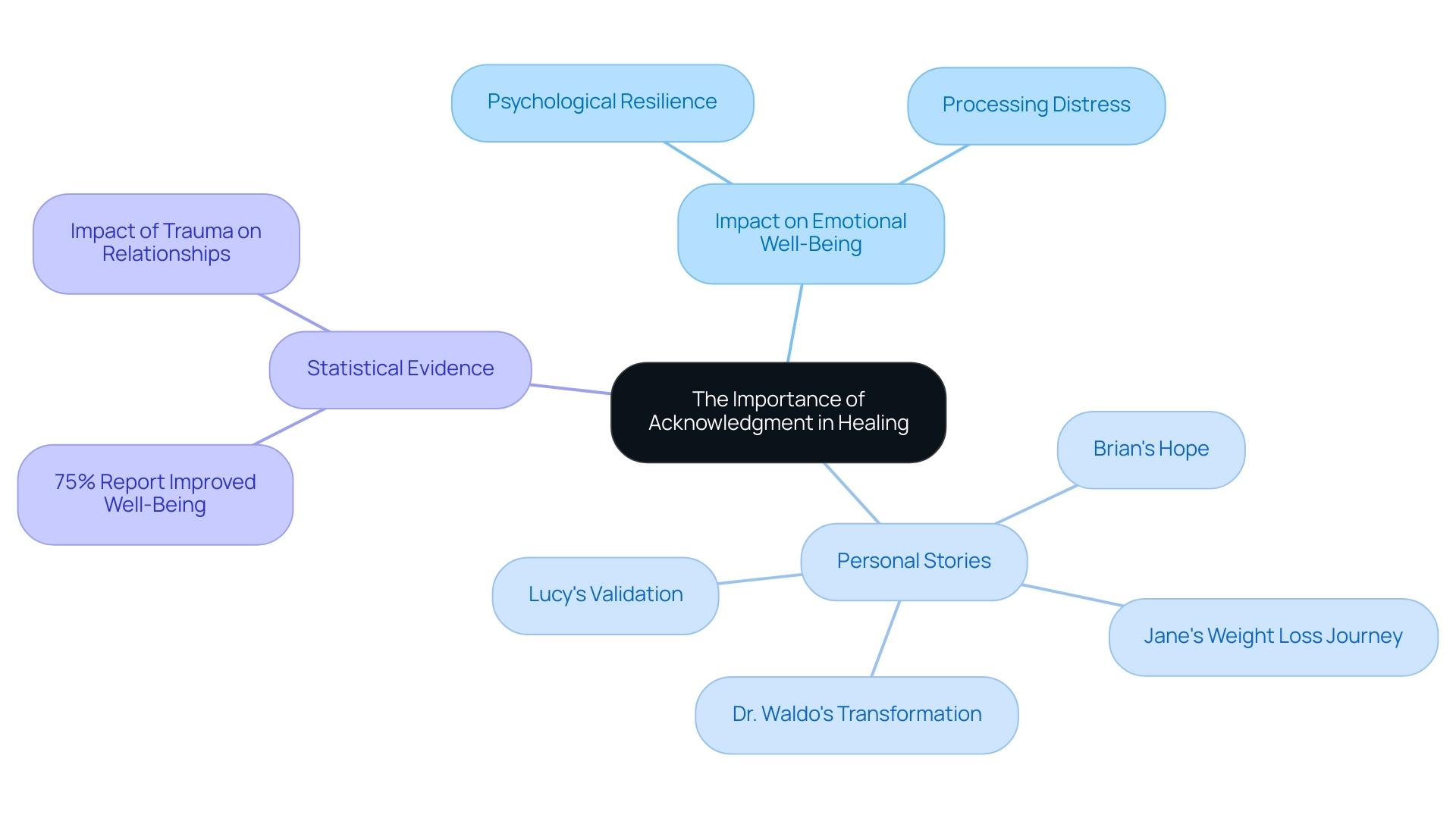
Conclusion
Recognizing the presence and impact of Little t trauma is essential for nurturing emotional well-being. This article has explored how these seemingly minor experiences—chronic criticism, emotional neglect, and social exclusion—can accumulate over time, leading to profound effects on self-esteem and mental health. By shining a light on these hidden wounds, individuals can begin to understand their emotional struggles and the importance of addressing them.
The pathways to healing are varied and accessible. From journaling and mindfulness to engaging in hypnotherapy, these strategies offer valuable tools for reclaiming self-worth and fostering resilience. The power of acknowledgment cannot be overstated, as it validates experiences and emotions, allowing individuals to process their trauma more effectively.
The testimonials shared throughout this article demonstrate the transformative potential of recognizing and addressing Little t trauma, showcasing how many have found hope and healing through innovative therapies.
Ultimately, confronting Little t trauma is not just about recovering from emotional pain; it is about empowering oneself to lead a fulfilling life. By embracing the journey of healing and utilizing available resources, individuals can pave the way for personal growth and emotional liberation. Taking the first step towards this journey is an act of courage and self-compassion, setting the stage for a brighter, more empowered future.




